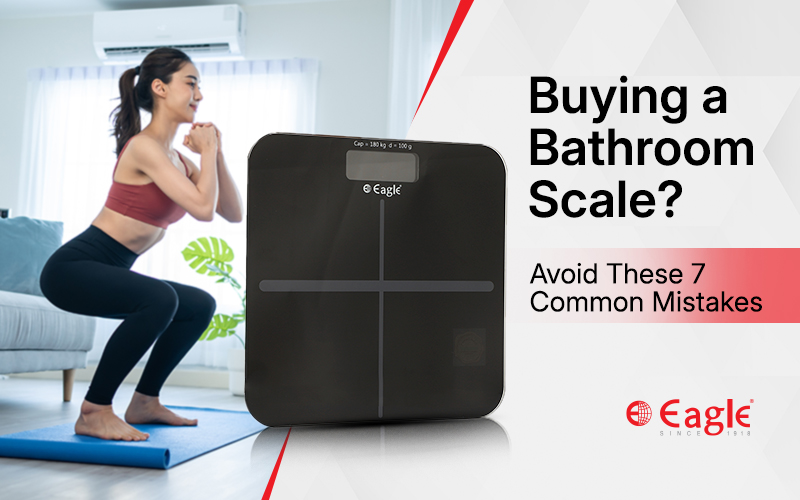One day, you feel motivated because you’ve lost a kilo, the next day, you’re frustrated because it suddenly shows two kilos gained for no reason.
Have you been relying on a faulty scale that gives you inconsistent results?
Choosing the correct bathroom scale and using it correctly makes a big difference. But most people either buy the wrong one or unknowingly use it in ways that ruin accuracy. That’s exactly what this blog will help you avoid.
What Is a Bathroom Scale?
A bathroom scale is a personal weighing device designed to measure body weight at home. Unlike industrial or medical weighing machines, bathroom scales are meant for your everyday use, especially if you’re serious about fitness, weight management, or even just monitoring your health.
A well-chosen scale with proper features becomes your accountability partner. In fact, many modern scales connect with smartphone apps, track body composition, and store data for multiple users.
6 Common Mistakes to Avoid When Buying a Bathroom Scale
Before you click “buy” or pick up any random scale, let’s talk about the mistakes you should avoid.
1. Neglecting the Zero Check
A well-calibrated scale starts and resets itself to zero when there is no load on the scale. If the scale you’re buying does not do this, it may be faulty. As a result, you’ll end up with numbers that are either higher or lower than your actual weight.
Before buying a scale, step on it 2–3 times to test it. Simply check the screen and ensure it reads 0.0. In the end, this one small habit leads to accurate tracking over time.
2. Ignoring Load Capacity Limits
Every scale has a maximum weight it can handle. For instance, a bathroom scale designed for 150 kilograms should not be used beyond that limit. As a result, overloading the scale damages its sensors. It also makes future readings unreliable. But surprisingly, many buyers ignore this specification completely.
Therefore, always check the maximum weight capacity before purchasing. However, if you need a higher range, go for models with 180 kilograms or more. Ultimately, respecting these limits ensures safety, accuracy, and a longer machine life.
3. Forgetting About Calibration Options
A scale that isn’t appropriately calibrated will never give accurate results. Calibration is the process that ensures your scale resets to zero before measuring. Otherwise, you’ll constantly see fluctuating or false readings.
Always look for a scale that has simple calibration settings. For instance, some models let you hold the power button for five seconds until the display flashes zero. Even better, a one-touch calibration button makes life easier and saves you from long-term frustration.

4. Choosing Style Over Durability
You might get tempted to pick the sleekest-looking scale. After all, they look beautiful. But remember, looks don’t always guarantee strength.
Bathroom scales are used daily. So, weak platforms or poor-quality sensors wear out quickly. Over time, cracks in the glass or damaged internal components can make the device unsafe and inaccurate.
Instead, opt for scales made with strong tempered glass, reinforced ABS plastic, or stainless-steel platforms. These materials resist damage and ensure longevity. Plus, ABS and steel also provide durability without compromising on design.
5. Overlooking Battery Efficiency
Weak or low batteries can affect your scale’s accuracy. For starters, they dim the display. They also reduce measurement accuracy. And sometimes, they even freeze the screen mid-measurement. As a result, you might mistake this for device failure when it’s actually just poor battery performance.
So, the smarter choice is to buy scales that display low-battery indicators. In addition, always keep spare batteries at home so that you can change them before they completely die out. Even better, consider models with rechargeable batteries. They’ll save money in the long run and decrease waste.
6. Surface Stability
Even if you buy the best bathroom scale, it will still give inaccurate readings if placed on an uneven surface. For instance, you shouldn’t put your scale on slightly tilted tiles, soft carpets, or shaky wooden boards. It disturbs the distribution of weight across the sensors.
As a result, an unstable base causes the sensors to get conflicting signals. The end outcome is inconsistency.
So, always place your scale on a hard, flat surface, preferably on a solid tile or hardwood floor. In addition, keep it in the same spot for consistency. That way, a stable foundation ensures your readings reflect reality.
Conclusion
A bathroom scale is a small device, but it plays a significant role in your health journey. In fact, buying the wrong one or misusing it can cost you motivation, time, and progress. After all, each mistake quietly erodes accuracy.
That’s why when you invest in the correct bathroom scale, you’re buying accountability, consistency, and a reliable way to track your health. Digital weighing scales by Eagle are smart scales with Android and iOS compatibility. They’re built with best-in-class materials and are highly accurate.
Visit Eagle Scales and invest in the best digital bathroom scale.






